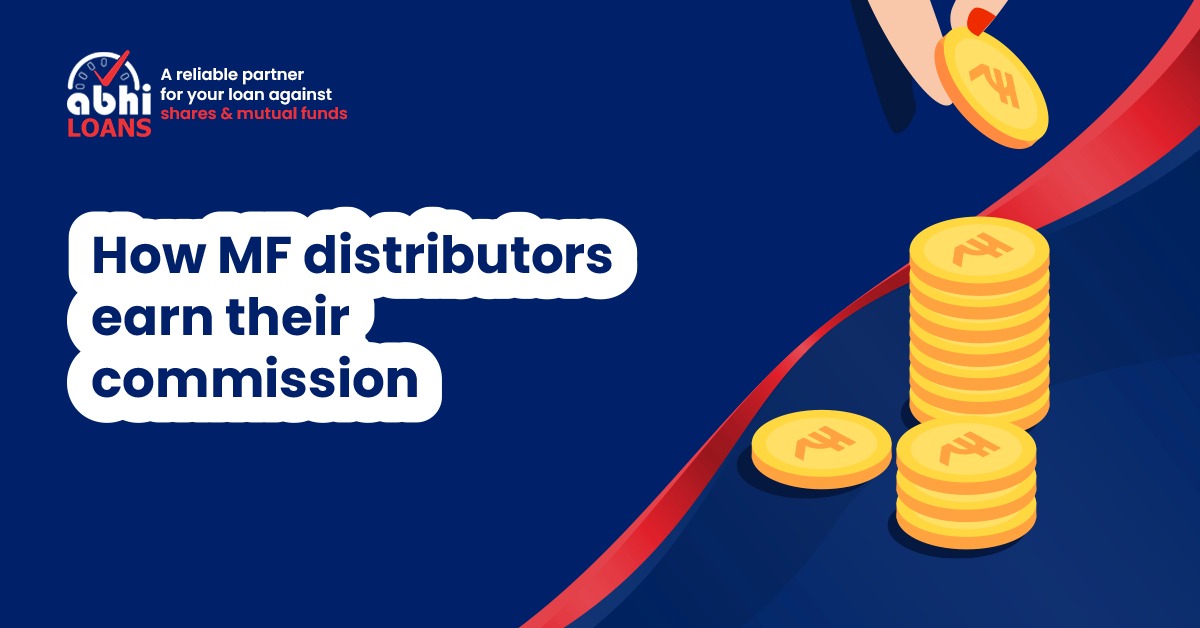How Mutual Funds distributors earn their commission?
Mutual funds distributors play a pivotal role in the Indian financial ecosystem by connecting investors with suitable mutual fund schemes. As investors seek professional advice and personalized guidance, distributors act as intermediaries, facilitating the investment process. In return for their services, mutual fund distributors earn a commission from asset management companies. It is referred to as a mutual fund distributor commission.
This article delves into the commission structure, the dynamic factors influencing earnings such as market trends and investor preferences, and the impact on investors’ financial journeys. Exploring the intricacies of “How MF Distributors Earn Their Commission?” can provide valuable insights into this symbiotic relationship between distributors and investors.
Understanding the Commission Structure

Upfront Commission
The upfront commission is a one-time payment that distributors receive at the time of the investor’s initial investment in a mutual fund scheme. It is calculated as a percentage of the investment amount and can vary depending on the type of mutual fund, the distributor’s agreement with the asset management company, and even the size of the investment. This commission serves as a compensation for the distributor’s efforts in onboarding investors and guiding them through the fund selection process.
Trail Commission
Trail commission, unlike upfront commission, is a recurring payment that distributors receive throughout the tenure of the investment. It is calculated as a percentage of the total assets under management (AUM) and is paid regularly as long as the investor remains invested in the scheme.
The trail commission in mutual funds incentivizes distributors to provide continuous support and service to investors, fostering a long-term relationship that aligns the distributor’s interests with the investor’s investment goals. This commission structure also emphasizes the distributor’s role in ensuring investor satisfaction and fund performance.
Regulatory Framework
The Securities and Exchange Board of India (SEBI) regulates the mutual fund industry and plays a crucial role in defining the commission structure for distributors. SEBI guidelines mandate complete transparency, ensuring that distributors disclose their commission to investors. This transparency helps investors understand the impact of distributor commissions on their overall returns.
Commissions of Mutual Fund Broker
There are Several factors that influence the commission amount, including:
- The company that manages assets and offers the commission.
- The exact mutual fund approach that is being applied.
- The consumer acquisition channel of distribution.
Factors Influencing Mutual funds Distributors Commission
Type of Mutual Fund Scheme

The commission structure can vary based on the type of mutual fund scheme. Equity funds generally offer higher commissions than debt or hybrid funds due to the higher risk associated with equity investments. Additionally, certain specialized funds, like sector-specific or thematic funds, might come with varying commission rates to reflect their distinct investment strategies. The mutual fund distributor commission, therefore, is influenced not only by market trends but also by the specific nature of the funds they recommend to investors.
Investment Amount
Typically, distributors receive higher commissions for larger investment amounts. This encourages distributors to focus on attracting high-net-worth clients, as the potential earnings from sizeable investments can significantly contribute to their overall income.
This aspect creates a dynamic where distributors strategically balance their efforts between serving a larger number of smaller investors and catering to wealthier individuals seeking more substantial investment opportunities.
SIP vs. Lump Sum Investments
Systematic Investment Plans (SIPs) are investment strategies where investors contribute a fixed amount regularly. Distributors often earn a higher commission for SIPs than lump-sum investments, as they involve ongoing efforts to maintain the investment.
This incentivizes distributors to promote the benefits of SIPs, emphasizing the disciplined approach and potential cost averaging advantages they offer, which align with the distributor’s continuous involvement in managing the investor’s portfolio.
Renewals
In the case of trail commission, distributors need to ensure that investors renew their investments at the end of the lock-in period or the scheme’s maturity. Renewals contribute to sustaining the distributor’s income.
Challenges Faced by Mutual Fund Distributors
Intense Competition
The mutual fund distribution landscape in India is highly competitive, with numerous distributors vying for investor attention. To stand out, distributors must offer exceptional services and tailor their advice to suit individual investors’ needs.
Investor Education and Awareness
A significant challenge is the lack of financial literacy among potential investors. Distributors need to invest time and effort in educating investors about mutual funds and the role of distributors in the investment process.
Market Volatility and Investor Behavior
During periods of market volatility, investors may panic and withdraw their investments, leading to lower AUM and, subsequently, lower trail commission earnings for distributors.
Regulatory Changes and Compliance
Distributors must stay updated with the latest SEBI regulations and ensure compliance with industry guidelines. This requires continuous training and monitoring of processes.
Impact of Commission on Investors
Expense Ratio
The commission paid to distributors is part of the expense ratio of a mutual fund scheme. As a result, higher commission payouts can lead to higher expense ratios, which may impact investors’ overall returns.
Direct vs. Regular Plans
Investors have the option to invest in direct plans that do not involve a distributor, or regular plans that include distributor commissions. Direct plans typically have lower expense ratios, as there are no distribution expenses involved.
Long-term vs. Short-term Investment Perspective
For long-term investors, the impact of commission on overall returns might be less significant. However, for short-term investors or those who actively manage their portfolios, choosing lower-cost direct plans can be more advantageous.
Conclusion
Mutual fund distributors in India play a crucial role in guiding investors through the investment journey and helping them achieve their financial objectives. The commission-based model compensates distributors for their services, but it also raises concerns about transparency and potential conflicts of interest.
As investors become more aware and cost-conscious, the industry is witnessing a shift towards direct plans and fee-based advisory services. Striking the right balance between distributor earnings and investor interests will continue to be a key challenge for the industry in the evolving financial landscape.
FAQs
How is the commission structure for mutual fund distributors determined?
The commission structure for mutual fund distributors is regulated by the Securities and Exchange Board of India (SEBI). SEBI has guidelines that specify the maximum commission distributors can earn based on the type of mutual fund scheme and the investment amount. The commission is typically paid in the form of upfront commission and trail commission.
What is an upfront commission, and how is it calculated?
The upfront commission is a one-time payment that distributors receive at the time of the investor’s initial investment in a mutual fund scheme. It is calculated as a percentage of the investment amount and can vary depending on the type of mutual fund and the distributor’s agreement with the asset management company.
What is a trail commission, and how does it work?
The trail commission is a recurring payment that distributors receive throughout the tenure of the investment. It is calculated as a percentage of the total assets under management (AUM) and is paid regularly as long as the investor remains invested in the scheme. The trail commission provides an incentive for distributors to provide ongoing services and support to investors.
Can investors negotiate the distributor commission?
The distributor commission is pre-determined by the asset management company and is non-negotiable for individual investors. However, larger institutional investors may have the ability to negotiate the commission based on the size of their investments.

